|
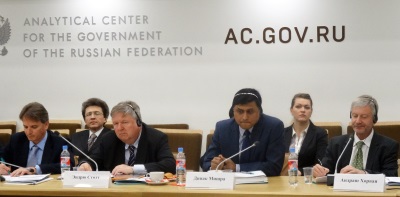 Institute of the Information Society acted as co-organizer of the
Roundtable “Digital Development in Russia”. Institute of the Information Society acted as co-organizer of the
Roundtable “Digital Development in Russia”.
On April 12, 2016 the World Bank
in cooperation with the Analytical Center for the Government of the Russian Federation
and the Institute of the Information Society organized Roundtable “Digital
Development in Russia”.
The opening event was
attended by Deputy Minister of Communications and Mass Communications of the
Russian Federation Alexey Kozyrev. Konstantin Noskov, Director of the
Analytical Center for the Russian Government and Andras Horvai, Director and Permanent
Representative of the World Bank in the Russian Federation presented
welcoming speeches to the participants of the event.
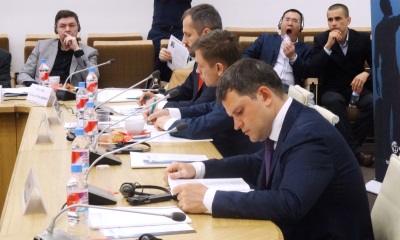 In the course of the first
session the World Development Report (WDR) - the World Bank's major
analytical edition, published since 1979, was presented. Every year, the
report reveals an actual topic of interest to the social and economic
development. The theme of the Report 2016 is “Digital Dividend”. Over the
37-year history of the WDR, this is the first report devoted entirely to the
role of ICT in the socio-economic development. The presentation of the report
was made by Deepak Mishra, Lead Economist, Co-Director of the World Bank's
Department for International Development. He noted that digital technology was
spreading quickly and widely in the developing world. However, the perceived
benefits of the use of technology for the socio-economic development do not
always meet the expectations. Digital technologies stimulate economic growth,
create new opportunities and improve the quality of services, but it is
necessary still to do much so that those benefits were equitably distributed among
the population. In the course of the first
session the World Development Report (WDR) - the World Bank's major
analytical edition, published since 1979, was presented. Every year, the
report reveals an actual topic of interest to the social and economic
development. The theme of the Report 2016 is “Digital Dividend”. Over the
37-year history of the WDR, this is the first report devoted entirely to the
role of ICT in the socio-economic development. The presentation of the report
was made by Deepak Mishra, Lead Economist, Co-Director of the World Bank's
Department for International Development. He noted that digital technology was
spreading quickly and widely in the developing world. However, the perceived
benefits of the use of technology for the socio-economic development do not
always meet the expectations. Digital technologies stimulate economic growth,
create new opportunities and improve the quality of services, but it is
necessary still to do much so that those benefits were equitably distributed among
the population.
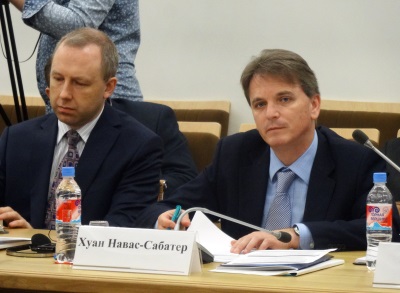 In the discussion Juan
Navas-Sabater, Leading expert in the field of ICT policy of the World Bank;
Yuri Hohlov, Chairman of the Board of Directors of the Institute of the
Information Society; Iliya Dimitrov, authorized person of the President of
the Russian Federation on protection of the rights of entrepreneurs; Evegeniy
Zinder, CEO of “FOSTAS” Foundation; Alexander Ryabushko, Deputy Director of
the Information Policy Department of the Ulyanovsk Region, and others. In the discussion Juan
Navas-Sabater, Leading expert in the field of ICT policy of the World Bank;
Yuri Hohlov, Chairman of the Board of Directors of the Institute of the
Information Society; Iliya Dimitrov, authorized person of the President of
the Russian Federation on protection of the rights of entrepreneurs; Evegeniy
Zinder, CEO of “FOSTAS” Foundation; Alexander Ryabushko, Deputy Director of
the Information Policy Department of the Ulyanovsk Region, and others.
The second session was held
to discuss the report “Digital Government: Perspectives for Russia”, prepared
by the experts of the World Bank and the Institute of the Information
Society. Main authors of the report - Andrew Stott, an international expert
of the World Bank, and Yuri Hohlov were the speakers.
Summarizing 20 years of
e-government development in the UK, Andrew Stott shared the thought that
e-government in this country has not met expectations and the many billion
dollars investment was not worth it. 40% of the population use e-government
services, but only 4% of the population make transactions when using the services.
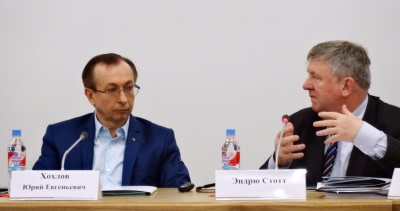 Yuri Hohlov said that in
recent years Russia has made significant progress in the implementation of
the current e-government concept including provision of public and municipal
services in electronic form in parallel to the other channels. Achievements also
include establishment of multifunctional centers and a single portal of
public services, which is functioning now; formation of a system for
interagency electronic document circulation; development of basic state
information resources (national database); provision of common services, such
as identification and authentication, and information from payment systems. Yuri Hohlov said that in
recent years Russia has made significant progress in the implementation of
the current e-government concept including provision of public and municipal
services in electronic form in parallel to the other channels. Achievements also
include establishment of multifunctional centers and a single portal of
public services, which is functioning now; formation of a system for
interagency electronic document circulation; development of basic state
information resources (national database); provision of common services, such
as identification and authentication, and information from payment systems.
Over the years, e-government
is making a major contribution to the solution of these problems. Nevertheless,
in many countries - even those that are regarded as leaders in the field of
e-government - the potential of transformation and full “digitization” of
services often remains unfulfilled. E-government leaders are now moving to
the next stage of transformation of the services, so-called “digital
government”. Based on the investment and transformation made during the
previous stages of e-government formation, this stage involves provision of services
fully in a digital format from request of the services at a portal to their implementation
and achievement of such a situation, when the departmental processes rely
mainly on data and not on documents.
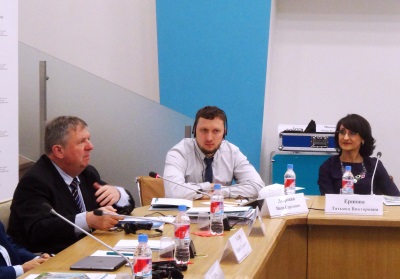 However, the level of use of
many electronic services remains rather narrow. Technological advances are
not always backed up by changes in administrative regulations or the
regulatory framework needed to ensure that their potential was fully
realized. Solutions to ensure interoperability have improved the quality of
interagency cooperation, but did not make electronic services much more
user-friendly. Internal administrative processes are still insufficiently digitized. However, the level of use of
many electronic services remains rather narrow. Technological advances are
not always backed up by changes in administrative regulations or the
regulatory framework needed to ensure that their potential was fully
realized. Solutions to ensure interoperability have improved the quality of
interagency cooperation, but did not make electronic services much more
user-friendly. Internal administrative processes are still insufficiently digitized.
The report was prepared to
assist the Government of the Russian Federation in the development and
implementation of projects designed to solve the aforementioned problems, as
well as further development of digital government. It contains high-level
recommendations that take into account the realities of Russia and the
advanced world experience. The report gives the following recommendations for
consideration by the Government of the Russian Federation:
- preparation of the updated digital government development
strategy of until 2020 based on best practice;
- ensuring the transformation of administrative
processes based on the principle of “digital by default”;
- construction of new infrastructure for the
implementation of digital government;
- creation of clear and integrated institutional
mechanism to develop strategy and control over its implementation;
- addressing “digital inclusion” (involvement in
the use of digital technologies and services), taking into account
geographical and demographic peculiarities of Russia.
In the discussion of the
report “Digital Government: Perspectives for Russia” Eugene Zinder, CEO of “FOSTAS”
Foundation; Ryabushko Alexander, Deputy Director of the Information Policy Department
of the Ulyanovsk Region; Sergey Kuchin, Minister of Information Technologies,
Communications and Mass Media of Nizhny Novgorod Region; Tatiana Ershova,
General Director of the Institute of the Information Society; Ivan Dubrovin, Chief
of Department of the Interagency Interaction System of the Ministry of
Communications of the Russian Federation; Anna Korobova, Deputy Head of the Economy
and the Long-term Development Department of the Prefecture of Zelenograd
Administrative District of Moscow, who oversees the sphere of information
technologies, and others participated.
Tatiana Ershova stressed
that the when implementing the recommendations contained in the report three
aspects that pose serious challenges for Russia must be taken into account: a
vast territory of the country, an aging population and a poor business
climate. In view of this, strategy of the development of digital government
in Russia will require:
- determining appropriate approaches and
technologies to ensure the connectivity and provision of digital
services in the difficult to access settlements;
- taking measures to ensure digital inclusion of
pensioners, who now make up one-third of Russia's population, including
the use of the existing infrastructure and capabilities of Sberbank of
Russia and social services centers;
- political will aimed at creating favorable
conditions for business development in the country.
The roundtable was attended
by the IIS workers: Louisa Rizmanova, Director of Department of International
Cooperation and Public Relations; Vladimir Kondratiev, Chief Specialist of
the Directorate of the Regional Programs; analysts of the Directorate of the Regional
Programs Alexander Katin and Vasiliy Pitul; managers Olga Kopyova and
Vladimir Gorbunov. |

